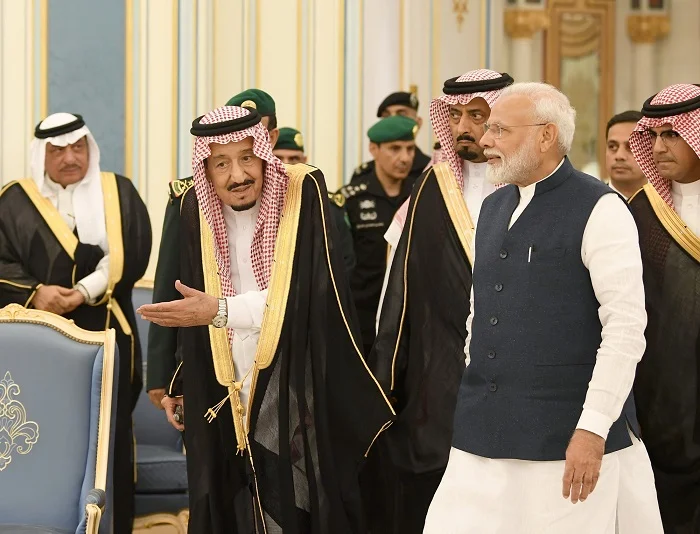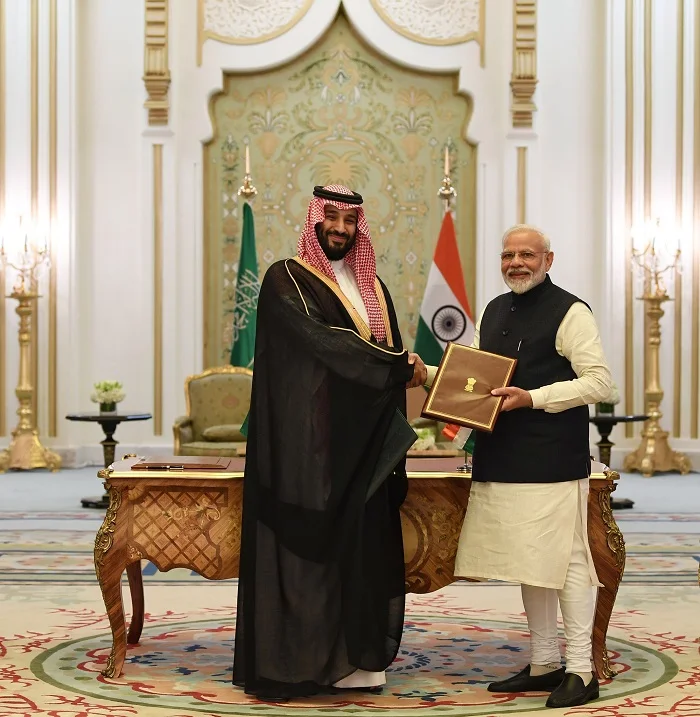

Prime Minister Narendra Modi with King Salman bin Abdulaziz Al Saud of Saudi Arabia in Riyadh in this October 2019 photo (All images courtesy: PIB)
India-Saudi Arabia relations, which have strengthened considerably over the past few years – especially after the visit of Prime Minister Narendra Modi to Riyadh in October 2019 – will be in focus this weekend as External Affairs Minister S Jaishankar travels straight from Tokyo to the Saudi capital today.
Jaishankar will co-chair the inaugural Ministerial Meeting of the Committee on Political, Security, Social and Cultural Cooperation (PSSC), established under the framework of the India-Saudi Arabia Strategic Partnership Council, with the Foreign Minister of Saudi Arabia, Prince Faisal bin Farhan Al Saud.
The Strategic Partnership Council, which has two sub-committees – PSSC and Committee on Economy and Investments – reflects the desire of the leadership of both sides to impart further momentum to this important relationship.
Both sub-committees have four functional levels of engagement – Summit level (Prime Minister and Crown Prince); ministerial level; senior officials’ meetings; and Joint Working Groups (JWGs).


The two ministers are expected to undertake a comprehensive review of the entire bilateral relationship and will discuss the progress under the four Joint Working Groups of the PSSC Committee – political and consular; legal and security; social and cultural; and Joint Committee on Defence Cooperation.
PM Modi had expressed India’s keenness to see greater investment from Saudi Arabia, including in key sectors like energy, IT and defence manufacturing when Faisal bin Farhan Al Saud called on him during his visit to New Delhi last year.
Much before the first ministerial meeting, groups and senior officials at the Secretary level have held discussions over the past few months.
During the three-day visit, Jaishankar will also meet other Saudi dignitaries as well as Secretary General of the Gulf Cooperation Council (GCC) Nayef Falah Mubarak Al-Hajraf to review the bilateral relations and discuss ways to enhance them.
As the top leadership of both countries remained in close touch even during the Covid pandemic, India and Saudi Arabia have witnessed a surge in cooperation in political, security, energy, trade, investment, health, food security, cultural and defence fields.
Saudi Arabia remains India’s fourth largest trading partner. More than 18% of India’s crude oil imports are sourced from Saudi Arabia. During FY22 (Apr-Dec), bilateral trade was valued at US$29.28 billion. During this period, India’s imports from Saudi Arabia were valued at US$22.65 billion and exports to Saudi Arabia were worth US$6.63 billion.
Other proposed major investments include the US$44 billion ‘West Coast Refinery and Petrochemicals Project’ in Maharashtra, which is being jointly built by Saudi Aramco, Abu Dhabi National Oil Company, and an Indian consortium, which includes Indian Oil Corporation, Hindustan Petroleum Corporation, and Bharat Petroleum Corporation.
In the renewable energy sector, Saudi Company Al-Fanar has a controlling stake in 600MW Wind Power projects in India.
Riyadh has also thanked India for standing by Saudi Arabia during the pandemic including facilitating the travel of Indian healthcare professionals to Saudi Arabia.
While a large number of Indian workers particularly in the Gulf returned to India due to Covid-19, the economic recovery in that region and their increasing openness to travel from India have now seen a return by many of them.
Meanwhile, the bilateral trade between India and the Gulf Cooperation Council (GCC) grew from US$ 87.35 billion in FY 2020-21 to US$ 154.66 billion in FY 2021-22, registering an increase of 77.06% on a year-on-year basis.
Giving details in the Lok Sabha of India’s exports to the GCC during the last five financial years, the Minister of State in the Ministry of Commerce and Industry Anupriya Patel had stated a few weeks ago that since FY 2017-18, on a compounded annual growth rate basis, bilateral trade between India and the GCC has grown by 10.57%.
Both ministers have also had useful exchanges of views on Afghanistan, the Gulf and the Indo-Pacific in the recent past.
Also Read: India and Japan hail ‘dramatic expansion’ in security and defence ties following 2+2 talks
India decisively asserted its military superiority over Pakistan during this month's brief but intense conflict,…
Trade associations and local business groups in Pakistan-occupied Gilgit-Baltistan (PoGB) launched an indefinite protest on…
A human chain and protest march was organized by various organizations in front of the…
The United States on Saturday announced the expansion of its security partnerships with India through…
Highlighting the use of indigenous platforms during Operation Sindoor, Chief of Defence Staff (CDS) General…
Congress MP Shashi Tharoor on Friday (local time) said that Colombia will issue a statement…